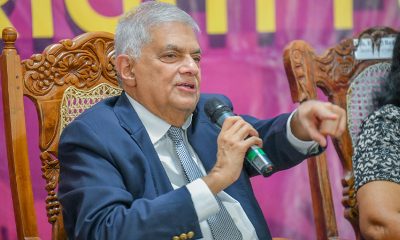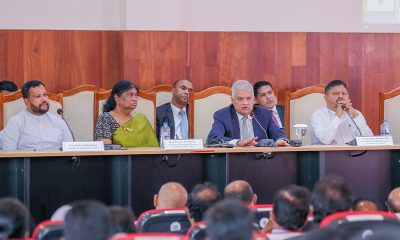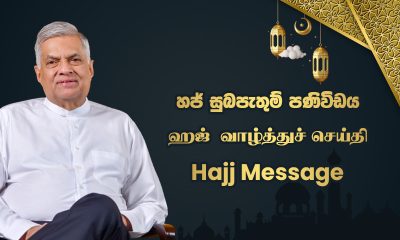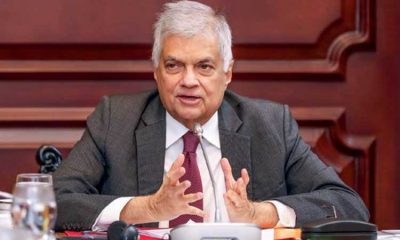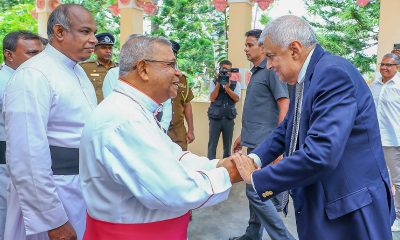Midweek Review
President’s agenda on track

In the wake of the SLPP reiterating its commitment to President Wickremesinghe, two groups of MPs – New Alliance and the SLFP among the ruling party – announced their partnership at a meeting held at Ambalantota on Saturday (08). Among the lawmakers present were Leader of the House Susil Premjayantha, Agriculture Minister Mahinda Amaraweera, Trade Minister Nalin Fernando, SLFP leader (Chairman) and Minister Nimal Siripala de Silva and Nimal Lanza, who spearheaded the move, along with Anura Priyadarshana Yapa. Their common agenda is obviously for the Wickreemsinghe’s benefit and at the expense of the SLPP, the Opposition, as well as the Maithripala Sirisena camp, now more or less a spent force due to his own doings, especially when it came to betrayals.
By Shamindra Ferdinando
The outcome of the recent vote on the Sri Lanka Electricity (Amendment) Bill proved that President Ranil Wickremesinghe’s agenda cannot be reversed as long as the Sri Lanka Podujuna Peramuna (SLPP) continued to back him for whatever reasons.
Of the 225 MPs in Parliament, 103 voted for the Bill on June 06. Only one UNPer (Wajira Abeywardena) was among them. The government was deprived of one vote by Kandy District MP Mahindananda Aluthgamage who sent fellow Kandy district lawmaker Gunatilleke Rajapaksa to the Military Hospital on the evening of June 03. The alleged assault on Gunatilleke Rajapaksa received front-page attention of all print media, while the electronic media, particularly the social media, thrived on the incident.
On the following day, the Public Debt Management Bill was passed without a division. Posting on ‘X’ (formerly Twitter), State Finance Minister Shehan Semasinghe declared that the Bill will provide for Public Debt Management, including the authorization to borrow, issue and to service the public debt. It would also enable issuing guarantees, on-lending, enter into suppliers’ credit and financial lease agreements for the establishment of the Public Debt Management Office and for matters connected therewith.
In spite of having just one MP, President Wickremesinghe ensured the enactment of new laws with the SLPP’s support. If National Freedom Front (NFF) leader Wimal Weerawansa’s recent declaration that under Wickremesinghe’s watch 75 new laws had been enacted is true, the Sri Lanka Electricity (Amendment) Bill is the 76th law pushed through by the Wickremesinghe-led regime.
However, the one-day debate and the vote on the Sri Lanka Electricity (Amendment) Bill – the first division shown after SLPP leader Mahinda Rajapaksa’s declaration on May 12 against rushing through with new legislation on the eve of a major national election and despite grave shortcomings pointed out by the Supreme Court determination – demonstrated that the SLPP would stand by President Wickremesinghe.
No less than twice President Mahinda Rajapaksa voted for the controversial Bill that the SC determined is inconsistent with the Constitution as a whole. Against the backdrop of the Rajapaksa-led move on June 06 in Parliament, his May 12 two-page declaration against ‘The sale of national assets and state-owned enterprises’ is irrelevant. In other words, the SLPP has discarded its own declaration.
What really compelled the Rajapaksas to vote for the Bill, in spite of allegations that the new law is intended to facilitate the Adani Group, led by billionaire Gautam Adani, whose Adani Green Energy, the renewable energy unit secured approval in February 2023 to invest $442 million and develop the 484 megawatt wind power plants in Mannar and Pooneryn.
Jathika Jana Balawegaya MP Vijitha Herath during the June 6 debate alleged that the new law was introduced to facilitate Adani operations here.
Former Speaker Chamal Rajapaksa and his son Shashendra Rajapaksa voted for the Bill whereas SLPP’s National Organizer Namal Rajapaksa quite conveniently skipped the vote. The lawmaker, aspiring to be party leader and their presidential candidate, owed the discerning public an explanation why he missed that vote. Having skipped the June 06 vote, Namal Rajapaksa appeared on stage at an SLPP meeting held in Rattota on Saturday (08) where he vowed to pursue the SLPP strategy. The National Organizer was surrounded by SLPP MPs who voted for Wickreemsinghe’s Bill a few days before. In the run-up to the June 06 vote, MP Namal Rajapaksa declared that Wickremesinghe was appointed as the President only up to the time for the next national election.
Regardless of the SC finding fault with the Bill, President’s Counsels – Foreign Minister Ali Sabry and Justice Minister Wijeyadasa Rajapakse and several other lawyers in the SLPP group voted for that Bill.
Samagi Jana Balawegaya (SJB) and Opposition Leader Sajith Premadasa should be seriously concerned over his failure to ensure all his MPs, excluding Harin Fernando and Manusha Nanayakkara, voted against that Bill. If not for the SLPP dissidents and the three-member JJB group, the Opposition would have been embarrassed by an extremely poor show. The SJB won 54 seats, including seven National List slots at the last General Election. But over one fourth of them were missing at the time of the vote.
The Opposition should realize that President Wickremesinghe needed that Bill enacted at any cost, regardless of the consequences, as his political agenda depends on it. That is the truth. Let me name those MPs who voted against President Ranil Wickremesinghe’s Bill. The list prepared by the Chief Opposition Whip’s Office has been divided into three sections namely dissident SLPP MPs, JJB MPs and SJB MPs.
The list of SLPP dissidents: Prof. G. L. Peiris, Wimal Weerawansa, Udaya Gammanpila, Dr. Nalaka Godahewa, Jayantha Samaraweera, Wasantha Yapa Bandara, Chandima Weerakkody, Shan Wijeyalal de Silva, Dallas Alahapperuma, Weerasumana Weerasinghe, Dr. Upul Galappaththy, Thilak Rajapaksha, Gunapala Ratnasekera, Jayaratna Herath, Dayasiri Jayasekera, Prof. Channa Jayasumana, Sarath Kumara Siri, Dilan Perera, Gevindu Kumaratunga and Prof. Charitha Herath (altogether 20)
The list of JJB members: Anura Kumara Dissanayake, Vijitha Herath and Dr. Harini Amarasuriya (20+3)
The list of SJB members: Sajith Premadasa, Dr. Harsha de Silva, Patali Champika Ranawaka, Mano Ganeshan, S.M. Marikkar, Ajith Mannapperuma, Kavinda Jayawardena, Harshana Rajakaruna, Lakshman Kiriella, Abdul Haleem, Velu Kumar, Rohini Kaviratne, Palani Digambaram, V. Radhakrishnan, M. Udayakumar, Gayantha Karunatilleke, Buddhika Pathirana, Dilip Wedaarachchi, Imran Maharoof, M.S. Thawfeek, Asoka Abeysinghe, Thushara Indunil Amarasena, Nalin Bandara, Niroshan Perera, Hector Appuhamy, Kings Kumar Nelson, Varuna Priyantha Liyanage, Thalatha Atukorale, Hesha Vithanage, Kabir Hashim, Sujith Sanjaya Perera, Ranjith Madduma Bandara, Eran Wickremaratne, Mayantha Dissanayake and Mujibur Rahuman (23+3+36=59).
The entire 10-member Tamil National Alliance (TNA), in spite of being divided over various political and personal issues, backed Wickremesinghe’s Bill by skipping the vote. That group included another President’s Counsel. Mathiaparanan Abraham Sumanthiran is his name. The TNA, too, owed an explanation regarding its decision to be absent. Did India, in any way, advise the one-time LTTE’s partner to keep away from the crucial vote?
SLPP National List MP and business tycoon Dhammika Perera, widely believed to be interested in contesting the Presidential Polls, didn’t vote along with SLPP MP Maithripala Sirisena and SJB Chairman Field Marshal Sarath Fonseka.
Prez tightens his grip on SLPP
Wily President Wickremesinghe, like his late uncle and mentor JRJ, dubbed the 20th Century Fox, cannot be faulted for exploiting the SLPP to the hilt. Wickremesinghe’s strategy is certainly not rocket science. Having offered Wickremesinghe the premiership (in April 2022), Finance portfolio (May 2022) and Presidency (July 2022), the SLPP created an environment in which it simply has no option but to cohabit with the UNP leader.
How could the SLPP take a different stand on any bill presented on Wickremesinghe’s directives after having accepted him as the leader of its parliamentary group, head of the Cabinet and their saviour in the face of the murderous onslaught launched by Aragalaya. So is it the fear of another instigated Aragalaya, where they would be defenceless with the police and security forces turning the other way, that is holding them back, as happened on May 09, 2022?
In fact, opposing Wickremesinghe’s agenda is ridiculous against the backdrop of the party having accepted Cabinet portfolios, with MEP leader and PM Dinesh Gunawardena being the leader of the severely compromised SLPP parliamentary group. Two Finance State Ministers, namely Shehan Semasinghe and Ranjith Siyambalapitiya, are part of the Wickremesinghe team. Both obviously voted for the Sri Lanka Electricity (Amendment) Bill.
Last week’s high profile vote proved beyond doubt that at least for the time being Wickremesinghe and the SLPP are inseparable. MP Namal Rajapaksa, being the SLPP’s National Organizer, under no circumstances can absolve himself of the responsibility for the passage of the Bill. In a way, in the case of the Sri Lanka Electricity (Amendment) Bill, avoiding such an important Bill is, perhaps, far worse than voting for it. Why do MPs fail to turn up for important Bills that are of national significance? At the time of last week’s vote, 61 MPs hadn’t been present in Parliament, whereas SLPP MP Udayakantha Gunatilleke’s vote (Kegalle district) though being present was not marked.
The overall deterioration of the country can be gauged by the conduct of political parties represented in Parliament. The systematic decline over the past couple of decades has eroded public confidence in the House to such an extent, unless immediate remedial measures are taken, collectively, those now wielding power can expect an Aragalaya-type uprising. Dissident SLPP MP Gevindu Cumaratunga gave such a warning during the debate on the Sri Lanka Electricity (Amendment) Bill.
The SLPP vote, on June 06 ,can be confidently declared as an outright rejection of the massive mandates that had been received at the 2019 presidential and 2020 parliamentary polls. The SLPP’s candidate Gotabaya Rajapaksa handsomely won the contest by polling a staggering 6,924,255 (52.25%) whereas at the parliamentary election the party secured an overwhelming 145 seats. Regardless of their much touted assurance to reverse the Yahapalana economic policies, against the backdrop of Aragalaya, the SLPP has teamed-up with Wickremesinghe.
The SLPP’s bid to empower Wickremesinghe as a stopgap measure has backfired and now is threatening the very basis of the party. The June 06 vote has tied-up the SLPP with Wickremesinghe who seemed to have taken hold of the party, regardless of tough talk by some lawmakers over the past several months. The SLPP has suddenly realized that the entire political environment changed with Wickremesinghe vigorously pursuing an agenda at the SLPP’s expense. But, the top SLPP leadership (the Rajapaksas) fearing that a large chunk of their parliamentary group would switch allegiance to Wickremesinghe and voted for a controversial Bill to avert a damaging split.
Daunting challenge
The Opposition seems to be in disarray. The leader of the main Opposition party should muster all his MPs or be prepared to face the consequences. Wickremesinghe’s triumph in Parliament, on June 06, proved yet again that highly critical SC determinations in respect of controversial Bills that had been presented to Parliament cannot be efficiently exploited by the Opposition, primarily due to the SLPP-Wickremesinghe tie-up. That is the reality.
The SLPP’s stand on Wickremesinghe’s controversial Economic Transformation Bill (ETB) is clear. There is no ambiguity in the ruling party’s position on ETB though dissident SLFPers have been vigorously campaigning against it.
State Finance Minister Semasinghe’s recent declarations, in and outside Parliament, underscored the SLPP’s support for that Bill. While the Parliament voted for the Sri Lanka (Electricity) Amendment Bill on June 6 late afternoon, Wickremesinghe had been at Ekala, Ja-Ela, at the opening of a medicine producing facility where he emphasized the importance of ETB. SJB heavyweight Dr. Rajitha Senaratne, contemplating his next move in a dicey political environment, was with Wickremesinghe. Another SJB dissident, Harin Fernando, now a Cabinet Minister, participated at the event. Both Dr. Senaratne and Harin Fernando were among those who missed the vote.
Wickremesinghe and the SLPP have stayed together though many speculated of a break-up of the alliance over the President’s refusal to accommodate a list of MPs in the cabinet – a request made in July 2022, immediately after he was sworn in as the President to complete the remainder of Gotabaya Rajapaksa’s term. Relations further deteriorated in the wake of Wickremesinghe turning down the SLPP’s plea to advance the General Election ahead of the Presidential Poll. But, the fear of the Opposition exploiting a break-up has compelled the SLPP to remain committed to Wickremesinghe. As the Chief Government Whip Prasanna Ranatuga declared on many occasions, the SLPP should throw its weight behind Wickremesinghe at the Presidential Poll.
Against the backdrop of the SLPP’s June 06 vote, there cannot be any other reason whatsoever not to officially declare support for Wickremesinghe.
With the Presidential Poll now inevitable, though Wickremesinghe’s Camp sought to influence speculation on a referendum on holding of the poll, political parties, and even MPs, seem busy in seeking arrangements with the powers that be. SJB MP A.H.M. Fowzie’s stand on Sri Lanka Electricity (Amendment) Bill is a case in point.
Among the 103 MPs who voted for Wckremesinghe’s Bill were several elected on other party tickets. Colombo District lawmaker Fowzie, who entered Parliament early last year to fill the vacancy created by the resignation of Mujibur Rahuman, voted with the SLPP parliamentary group.
In spite of Nazeer Ahmed of SLMC losing his Batticaloa district seat in Oct last year, on SC judgment, MPs still continue the despicable practice. SC faulted Ahamed for voting for the SLPP Budget 2021, regardless of an SLMC decision to vote against. Wickremesinghe rewarded him with comfortable office-Governor of the North Western Province.
President Wickremesinghe is on record as having said that the ETB intends to ensure the political parties do not deviate on economic policy that had been forced on the incumbent government due to economic fallout. Then there must be a consensus on members switching sides at will for their convenience, at the expense of those who voted for them and the parties they represented.
MP Cumaratunga’s June 06 speech in Parliament highlighted the pathetic state in the House. The first time entrant to Parliament pointed out the failure on the part of Speaker Mahinda Yapa Abeywardena to provide an opportunity for MPs to express their views on this piece of legislation. Cumaratunga fiercely attacked the Speaker for not extending the debate by another day. The Yuthukama leader questioned the chair whether he, Cumaratunga, was allocated five minutes to silence him.
However, the dissident MP must be told that even if the debate on that particular Bill had been extended by another day, the outcome wouldn’t have been any different. The SLPP has been compelled to go along with Wickremesinghe, at least for the time being. No one should be surprised if the SLPP declared its support for Wickremesinghe soon after the Election Commission announces the Presidential Election in a few weeks.
The inordinate delay in the SLPP’s announcement indicated that the party remained unsure of its strategy and may go along with Wickremesinghe, as repeatedly suggested by Minister Prasanna Ranatunga.
It would be pertinent to mention that among those who voted for Wickremesinghe’s Bill were another group of dissident MPs seeking to reach an agreement with the President in respect of both presidential and parliamentary polls. That group includes Nimal Lanza, Anura Priyadarshana Yapa and Education Minister Susil Premjayantha who is also the Leader of the House and Trade Minister Nalin Bandara.
The SLPP initially backed Wickremesinghe without hesitation. Some even went to the extent of finding fault with Gotabaya Rajapaksa for being inexperienced. The party felt confident of Wickremesinghe’s leadership as he was expected to complete the remainder of Gotabaya Rajapaksa’s five-year term and leave. Obviously, the SLPP didn’t expect a political threat from Wickremesinghe. In fact, some even asserted that Wickremesinghe would be grateful to the SLPP for choosing him. Ousted President Gotabaya Rajapaksa, in his memoirs declared Wickremesinghe as the best person to restore law and order.
But a slew of new laws enacted over the past two years has strengthened Wickremesinghe’s hands and tied the SLPP to the UNP leader. The passage of the Online Safety Bill, the Domestic Debt Optimisation (DDO) Bill and the Inland Revenue (Amendment) Act No. 14 of 2023 were among the laws that couldn’t have been approved without the SLPP’s backing.
Regardless of challenges, Wickremesinghe has succeeded in maintaining tight control over his partnership with the SLPP. That is a situation some cannot stomach but they cannot do anything about it, for the moment.
Midweek Review
Daya Pathirana killing and transformation of the JVP

JVP leader Somawansa Amarasinghe, who returned to Sri Lanka in late Nov, 2001, ending a 12-year self-imposed exile in Europe, declared that India helped him flee certain death as the government crushed his party’s second insurrection against the state in the ’80s, using even death squads. Amarasinghe, sole surviving member of the original politburo of the JVP, profusely thanked India and former Prime Minister V.P. Singh for helping him survive the crackdown. Neither the JVP nor India never explained the circumstances New Delhi facilitated Amarasinghe’s escape, particularly against the backdrop of the JVP’s frenzied anti-India campaign. The JVP has claimed to have killed Indian soldiers in the East during the 1987-1989 period. Addressing his first public meeting at Kalutara, a day after his arrival, Amarasinghe showed signs that the party had shed its anti-India policy of yesteryears. The JVPer paid tribute to the people of India, PM Singh and Indian officials who helped him escape.
By Shamindra Ferdinando
Forty years after the killing of Daya Pathirana, the third head of the Independent Student Union (ISU) by the Socialist Students’ Union (SSU), affiliated with the JVP, one-time Divaina journalist Dharman Wickremaretne has dealt with the ISU’s connections with some Tamil terrorist groups. The LTTE (Liberation Tigers of Tamil Eelam) hadn’t been among them, according to Wickremaretne’s Daya Pathirana Ghathanaye Nodutu Peththa (The Unseen Side of Daya Pathirana Killing), the fifth of a series of books that discussed the two abortive insurgencies launched by the JVP in 1971 and the early ’80s.
Pathirana was killed on 15 December, 1986. His body was found at Hirana, Panadura. Pathirana’s associate, Punchiralalage Somasiri, also of the ISU, who had been abducted, along with Pathirana, was brutally attacked but, almost by a miracle, survived to tell the tale. Daya Pathirana was the second person killed after the formation of the Deshapremi Janatha Vyaparaya (DJV), the macabre wing of the JVP, in early March 1986. The DJV’s first head had been JVP politburo member Saman Piyasiri Fernando.
Its first victim was H. Jayawickrema, Principal of Middeniya Gonahena Vidyalaya, killed on 05 December, 1986. The JVP found fault with him for suspending several students for putting up JVP posters.
Wickremaretne, who had been relentlessly searching for information, regarding the violent student movements for two decades, was lucky to receive obviously unconditional support of those who were involved with the SSU and ISU as well as other outfits. Somasiri was among them.
Deepthi Lamaheva had been ISU’s first leader. Warnakulasooriya succeeded Lamahewa and was replaced by Pathirana. After Pathirana’s killing K.L. Dharmasiri took over. Interestingly, the author justified Daya Pathirana’s killing on the basis that those who believed in violence died by it.
Wickremaretne’s latest book, the fifth of the series on the JVP, discussed hitherto largely untouched subject – the links between undergraduates in the South and northern terrorists, even before the July 1983 violence in the wake of the LTTE killing 12 soldiers, and an officer, while on a routine patrol at Thinnavely, Jaffna.
The LTTE emerged as the main terrorist group, after the Jaffna killings, while other groups plotted to cause mayhem. The emergence of the LTTE compelled the then JRJ government to transfer all available police and military resources to the North, due to the constant attacks that gradually weakened government authority there. In Colombo, ISU and Tamil groups, including the PLOTE (People’s Liberation Tigers of Tamil Eelam) enhanced cooperation. Wickremaretne shed light on a disturbing ISU-PLOTE connection that hadn’t ever been examined or discussed or received sufficient public attention.
In fact, EROS (Eelam Revolutionary Organisation of Students), too, had been involved with the ISU. According to the author, the ISU had its first meeting on 10 April, 1980. In the following year, ISU established contact with the EPRLF (Eelam People’s Revolutionary Liberation Front). The involvement of ISU with the PLOTE and Wickremaretne revealed how the SSU probed that link and went to the extent of secretly interrogating ISU members in a bid to ascertain the details of that connection. ISU activist Pradeep Udayakumara Thenuwara had been forcibly taken to Sri Jayewardenepura University where he was subjected to strenuous interrogation by SSU in a bid to identify those who were involved in a high profile PLOTE operation.
The author ascertained that the SSU suspected Pathirana’s direct involvement in the PLOTE attack on the Nikaweratiya Police Station, and the Nikaweratiya branch of the People’s Bank, on April 26, 1985. The SSU believed that out of a 16-member gang that carried out the twin attacks, two were ISU members, namely Pathirana, and another identified as Thalathu Oya Seneviratne, aka Captain Senevi.
The SSU received information regarding ISU’s direct involvement in the Nikaweratiya attacks from hardcore PLOTE cadre Nagalingam Manikkadasan, whose mother was a Sinhalese and closely related to JVP’s Upatissa Gamanayake. The LTTE killed Manikkadasan in a bomb attack on a PLOTE office, in Vavuniya, in September, 1999. The writer met Manikkadasan, at Bambapalitiya, in 1997, in the company of Dharmalingham Siddharthan. The PLOTE had been involved in operations in support of President Chandrika Bandaranaike Kumaratunga’s administration.
It was President Premadasa who first paved the way for Tamil groups to enter the political mainstream. In spite of some of his own advisors expressing concern over Premadasa’s handling of negotiations with the LTTE, he ordered the then Elections Commissioner Chandrananda de Silva to grant political recognition to the LTTE. The LTTE’s political wing PFLT (People’s Front of Liberation Tigers) received recognition in early December, 1989, seven months before Eelam War II erupted.
Transformation of ISU
The author discussed the formation of the ISU, its key members, links with Tamil groups, and the murderous role in the overall counter insurgency campaign during JRJ and Ranasinghe Premadasa presidencies. Some of those who had been involved with the ISU may have ended up with various other groups, even civil society groups. Somasiri, who was abducted along with Pathirana at Thunmulla and attacked with the same specialised knife, but survived, is such a person.
Somasiri contested the 06 May Local Government elections, on the Jana Aragala Sandhanaya ticket. Jana Aragala Sandhanaya is a front organisation of the Frontline Socialist Party/ Peratugaami pakshaya, a breakaway faction of the JVP that also played a critical role in the violent protest campaign Aragalaya against President Gotabaya Rajapaksa. That break-up happened in April 2012, The wartime Defence Secretary, who secured the presidency at the 2019 presidential election, with 6.9 mn votes, was forced to give up office, in July 2022, and flee the country.
Somasiri and Jana Aragala Sandhanaya were unsuccessful; the group contested 154 Local Government bodies and only managed to secure only 16 seats whereas the ruling party JVP comfortably won the vast majority of Municipal Councils, Urban Councils and Pradeshiya Sabhas.
Let us get back to the period of terror when the ISU was an integral part of the UNP’s bloody response to the JVP challenge. The signing of the Indo-Lanka accord, in late July 1987, resulted in the intensification of violence by both parties. Wickremaretne disclosed secret talks between ISU leader K.L. Dharmasiri and the then Senior SSP (Colombo South) Abdul Cader Abdul Gafoor to plan a major operation to apprehend undergraduates likely to lead protests against the Indo-Lanka accord. Among those arrested were Gevindu Cumaratunga and Anupa Pasqual. Cumaratunga, in his capacity as the leader of civil society group Yuthukama, that contributed to the campaign against Yahapalanaya, was accommodated on the SLPP National List (2020 to 2024) whereas Pasqual, also of Yuthukama, entered Parliament on the SLPP ticket, having contested Kalutara. Pasqual switched his allegiance to Ranil Wickremesinghe after Gotabaya Rajapaksa’s ouster in July 2022.
SSU/JVP killed K.L. Dharmasiri on 19 August, 1989, in Colomba Kochchikade just a few months before the Army apprehended and killed JVP leader Rohana Wijeweera. Towards the end of the counter insurgency campaign, a section of the ISU was integrated with the military (National Guard). The UNP government had no qualms in granting them a monthly payment.
Referring to torture chambers operated at the Law Faculty of the Colombo University and Yataro operations centre, Havelock Town, author Wickremaretne underscored the direct involvement of the ISU in running them.
Maj. Tuan Nizam Muthaliff, who had been in charge of the Yataro ‘facility,’ located near State Defence Minister Ranjan Wijeratne’s residence, is widely believed to have shot Wijeweera in November, 1989. Muthaliff earned the wrath of the LTTE for his ‘work’ and was shot dead on May 3, 2005, at Polhengoda junction, Narahenpita. At the time of Muthaliff’s assassination, he served in the Military Intelligence.
Premadasa-SSU/JVP link
Ex-lawmaker and Jathika Chinthanaya Kandayama stalwart Gevindu Cumaratunga, in his brief address to the gathering, at Wickremaretne’s book launch, in Colombo, compared Daya Pathirana’s killing with the recent death of Nandana Gunatilleke, one-time frontline JVPer.
Questioning the suspicious circumstances surrounding Gunatilleke’s demise, Cumaratunga strongly emphasised that assassinations shouldn’t be used as a political tool or a weapon to achieve objectives. The outspoken political activist discussed the Pathirana killing and Gunatilleke’s demise, recalling the false accusations directed at the then UNPer Gamini Lokuge regarding the high profile 1986 hit.
Cumaratunga alleged that the SSU/JVP having killed Daya Pathirana made a despicable bid to pass the blame to others. Turning towards the author, Cumaratunga heaped praise on Wickremaretne for naming the SSU/JVP hit team and for the print media coverage provided to the student movements, particularly those based at the Colombo University.
Cumaratunga didn’t hold back. He tore into SSU/JVP while questioning their current strategies. At one point a section of the audience interrupted Cumaratunga as he made references to JVP-led Jathika Jana Balawegaya (JJB) and JJB strategist Prof. Nirmal Dewasiri, who had been with the SSU during those dark days. Cumaratunga recalled him attending Daya Pathirana’s funeral in Matara though he felt that they could be targeted.
Perhaps the most controversial and contentious issue raised by Cumaratunga was Ranasinghe Premadasa’s alleged links with the SSU/JVP. The ex-lawmaker reminded the SSU/JVP continuing with anti-JRJ campaign even after the UNP named Ranasinghe Premadasa as their candidature for the December 1988 presidential election. His inference was clear. By the time Premadasa secured the presidential nomination he had already reached a consensus with the SSU/JVP as he feared JRJ would double cross him and give the nomination to one of his other favourites, like Gamini Dissanayake or Lalith Athulathmudali.
There had been intense discussions involving various factions, especially among the most powerful SSU cadre that led to putting up posters targeting Premadasa at the Colombo University. Premadasa had expressed surprise at the appearance of such posters amidst his high profile ‘Me Kawuda’ ‘Monawada Karanne’poster campaign. Having questioned the appearance of posters against him at the Colombo University, Premadasa told Parliament he would inquire into such claims and respond. Cumaratunga alleged that night UNP goons entered the Colombo University to clean up the place.
The speaker suggested that the SSU/JVP backed Premadasa’s presidential bid and the UNP leader may have failed to emerge victorious without their support. He seemed quite confident of his assertion. Did the SSU/JVP contribute to Premadasa’s victory at one of the bloodiest post-independence elections in our history.
Cumaratunga didn’t forget to comment on his erstwhile comrade Anupa Pasqual. Alleging that Pasqual betrayed Yuthukama when he switched allegiance to Wickremesinghe, Cumaratunga, however, paid a glowing tribute to him for being a courageous responder, as a student leader.
SSU accepts Eelam
One of the most interesting chapters was the one that dealt with the Viplawadi Janatha Vimukthi Peramuna/Revolutionary Janatha Vimukthi Peramuna (RJVP), widely known as the Vikalpa Kandaya/Alternative Group and the ISU mount joint campaigns with Tamil groups. Both University groups received weapons training, courtesy PLOTE and EPRLF, both here, and in India, in the run-up to the so-called Indo-Lanka Peace Accord. In short, they accepted Tamils’ right to self-determination.
The author also claimed that the late Dharmeratnam Sivaram had been in touch with ISU and was directly involved in arranging weapons training for ISU. No less a person than PLOTE Chief Uma Maheswaran had told the author that PLOTE provided weapons training to ISU, free of charge ,and the JVP for a fee. Sivaram, later contributed to several English newspapers, under the pen name Taraki, beginning with The Island. By then, he propagated the LTTE line that the war couldn’t be brought to a successful conclusion through military means. Taraki was abducted near the Bambalapitiya Police Station on the night of 28 April, 2005, and his body was found the following day.
The LTTE conferred the “Maamanithar” title upon the journalist, the highest civilian honour of the movement.
In the run up to the Indo-Lanka Peace Accord, India freely distributed weapons to Tamil terrorist groups here who in turn trained Sinhala youth.
Had it been part of the overall Indian destabilisation project, directed at Sri Lanka? PLOTE and EPRLF couldn’t have arranged weapons training in India as well as terrorist camps here without India’s knowledge. Unfortunately, Sri Lanka never sought to examine the origins of terrorism here and identified those who propagated and promoted separatist ideals.
Exactly a year before Daya Pathirana’s killing, arrangements had been made by ISU to dispatch a 15-member group to India. But, that move had been cancelled after law enforcement authorities apprehended some of those who received weapons training in India earlier. Wickremaretne’s narrative of the students’ movement, with the primary focus of the University of Colombo, is a must read. The author shed light on the despicable Indian destabilisation project that, if succeeded, could have caused and equally destructive war in the South. In a way, Daya Pathirana’s killing preempted possible wider conflict in the South.
Gevindu Cumaratunga, in his thought-provoking speech, commented on Daya Pathirana. At the time Cumaratunga entered Colombo University, he hadn’t been interested at all in politics. But, the way the ISU strongman promoted separatism, influenced Cumaratunga to counter those arguments. The ex-MP recollected how Daya Pathirana, a heavy smoker (almost always with a cigarette in his hand) warned of dire consequences if he persisted with his counter views.
In fact, Gevindu Cumaratunga ensured that the ’80s terror period was appropriately discussed at the book launch. Unfortunately, Wickremaretne’s book didn’t cause the anticipated response, and a dialogue involving various interested parties. It would be pertinent to mention that at the time the SSU/JVP decided to eliminate Daya Pathirana, it automatically received the tacit support of other student factions, affiliated to other political parties, including the UNP.
Soon after Anura Kumara Dissanayake received the leadership of the JVP from Somawansa Amarasinghe, in December 2014, he, in an interview with Saroj Pathirana of BBC Sandeshaya, regretted their actions during the second insurgency. Responding to Pathirana’s query, Dissanayake not only regretted but asked for forgiveness for nearly 6,000 killings perpetrated by the party during that period. Author Wickremaretne cleverly used FSP leader Kumar Gunaratnam’s interview with Upul Shantha Sannasgala, aired on Rupavahini on 21 November, 2019, to remind the reader that he, too, had been with the JVP at the time the decision was taken to eliminate Daya Pathirana. Gunaratnam moved out of the JVP, in April 2012, after years of turmoil. It would be pertinent to mention that Wimal Weerawansa-Nandana Gunatilleke led a group that sided with President Mahinda Rajapaksa during his first term, too, and had been with the party by that time. Although the party split over the years, those who served the interests of the JVP, during the 1980-1990 period, cannot absolve themselves of the violence perpetrated by the party. This should apply to the JVPers now in the Jathika Jana Balawegaya (JJB), a political party formed in July 2019 to create a platform for Dissanayake to contest the 2019 presidential election. Dissanayake secured a distant third place (418,553 votes [3.16%])
However, the JVP terrorism cannot be examined without taking into JRJ’s overall political strategy meant to suppress political opposition. The utterly disgusting strategy led to the rigged December 1982 referendum that gave JRJ the opportunity to postpone the parliamentary elections, scheduled for August 1983. JRJ feared his party would lose the super majority in Parliament, hence the irresponsible violence marred referendum, the only referendum ever held here to put off the election. On 30 July, 1983, JRJ proscribed the JVP, along with the Nawa Sama Samaja Party and the Communist Party, on the false pretext of carrying out attacks on the Tamil community, following the killing of 13 soldiers in Jaffna.
Under Dissanayake’s leadership, the JVP underwent total a overhaul but it was Somawansa Amarasinghe who paved the way. Under Somawansa’s leadership, the party took the most controversial decision to throw its weight behind warwinning Army Chief General (retd) Sarath Fonseka at the 2010 presidential election. That decision, the writer feels, can be compared only with the decision to launch its second terror campaign in response to JRJ’s political strategy. How could we forget Somawansa Amarasinghe joining hands with the UNP and one-time LTTE ally, the Tamil National Alliance (TNA), to field Fonseka? Although they failed in that US-backed vile scheme, in 2010, success was achieved at the 2015 presidential election when Maithripala Sirisena was elected.
Perhaps, the JVP took advantage of the developing situation (post-Indo-Lanka Peace Accord), particularly the induction of the Indian Army here, in July 1987, to intensify their campaign. In the aftermath of that, the JVP attacked the UNP parliamentary group with hand grenades in Parliament. The August 1987 attack killed Matara District MP Keerthi Abeywickrema and staffer Nobert Senadheera while 16 received injuries. Both President JRJ and Prime Minister Ranasinghe Premadasa had been present at the time the two hand grenades were thrown at the group.
Had the JVP plot to assassinate JRJ and Premadasa succeeded in August 1987, what would have happened? Gevindu Cumaratunga, during his speech also raised a very interesting question. The nationalist asked where ISU Daya Pathirana would have been if he survived the murderous JVP.
Midweek Review
Reaping a late harvest Musings of an Old Man

I am an old man, having reached “four score and five” years, to describe my age in archaic terms. From a biological perspective, I have “grown old.” However, I believe that for those with sufficient inner resources, old age provides fertile ground to cultivate a new outlook and reap a late harvest before the sun sets on life.
Negative Characterisation of Old Age
My early medical education and training familiarised me with the concept of biological ageing: that every living organism inevitably undergoes progressive degeneration of its tissues over time. Old age is often associated with disease, disability, cognitive decline, and dependence. There is an inkling of futility, alienation, and despair as one approaches death. Losses accumulate. As Shakespeare wrote in Hamlet, “When sorrows come, they come not single spies, but in battalions.” Doctors may experience difficulty in treating older people and sometimes adopt an attitude of therapeutic nihilism toward a life perceived to be in decline.
Categorical assignment of symptoms is essential in medical practice when arriving at a diagnosis. However, placing an individual into the box of a “geriatric” is another matter, often resulting in unintended age segregation and stigmatisation rather than liberation of the elderly. Such labelling may amount to ageism. It is interesting to note that etymologically, the English word geriatric and the Sanskrit word jara both stem from the Indo-European root geront, meaning old age and decay, leading to death (jara-marana).
Even Sigmund Freud (1875–1961), the doyen of psychoanalysis, who influenced my understanding of personality structure and development during my psychiatric training, focused primarily on early development and youth, giving comparatively little attention to the psychology of old age. He believed that instinctual drives lost their impetus with ageing and famously remarked that “ageing is the castration of youth,” implying infertility not only in the biological sense. It is perhaps not surprising that Freud began his career as a neurologist and studied cerebral palsy.
Potential for Growth in Old Age
The model of human development proposed by the psychologist Erik Erikson (1902–1994), which he termed the “eight stages of man,” is far more appealing to me. His theory spans the entire life cycle, with each stage presenting a developmental task involving the negotiation of opposing forces; success or failure influences the trajectory of later life. The task of old age is to reconcile the polarity between “ego integrity” and “ego despair,” determining the emotional life of the elderly.
Ego integrity, according to Erikson, is the sense of self developed through working through the crises (challenges) of earlier stages and accruing psychological assets through lived experience. Ego despair, in contrast, results from the cumulative impact of multiple physical and emotional losses, especially during the final stage of life. A major task of old age is to maintain dignity amidst such emotionally debilitating forces. Negotiating between these polarities offers the potential for continued growth in old age, leading to what might be called a “meaningful finish.”
I do not dispute the concept of biological ageing. However, I do not regard old age as a terminal phase in which growth ceases and one is simply destined to wither and die. Though shadowed by physical frailty, diminishing sensory capacities and an apparent waning of vitality, there persists a proactive human spirit that endures well into late life. There is a need in old age to rekindle that spirit. Ageing itself can provide creative opportunities and avenues for productivity. The aim is to bring life to a meaningful close.
To generate such change despite the obstacles of ageing — disability and stigmatisation — the elderly require a sense of agency, a gleam of hope, and a sustaining aspiration. This may sound illusory; yet if such illusions are benign and life-affirming, why not allow them?
Sharon Kaufman, in her book The Ageless Self: Sources of Meaning in Late Life, argues that “old age” is a social construct resisted by many elders. Rather than identifying with decline, they perceive identity as a lifelong process despite physical and social change. They find meaning in remaining authentically themselves, assimilating and reformulating diverse life experiences through family relationships, professional achievements, and personal values.
Creative Living in Old Age
We can think of many artists, writers, and thinkers who produced their most iconic, mature, or ground-breaking work in later years, demonstrating that creativity can deepen and flourish with age. I do not suggest that we should all aspire to become a Monet, Picasso, or Chomsky. Rather, I use the term “creativity” in a broader sense — to illuminate its relevance to ordinary, everyday living.
Endowed with wisdom accumulated through life’s experiences, the elderly have the opportunity for developmental self-transformation — to connect with new identities, perspectives, and aspirations, and to engage in a continuing quest for purpose and meaning. Such a quest serves an essential function in sustaining mental health and well-being.
Old age offers opportunities for psychological adaptation and renewal. Many elders use the additional time afforded by retirement to broaden their knowledge, pursue new goals, and cultivate creativity — an old age characterised by wholeness, purpose, and coherence that keeps the human spirit alive and growing even as one’s days draw to a close.
Creative living in old age requires remaining physically, cognitively, emotionally, and socially engaged, and experiencing life as meaningful. It is important to sustain an optimistic perception of health, while distancing oneself from excessive preoccupation with pain and trauma. Positive perceptions of oneself and of the future help sustain well-being. Engage in lifelong learning, maintain curiosity, challenge assumptions — for learning itself is a meaning-making process. Nurture meaningful relationships to avoid disengagement, and enter into respectful dialogue, not only with those who agree with you. Cultivate a spiritual orientation and come to terms with mortality.
The developmental task of old age is to continue growing even as one approaches death — to reap a late harvest. As Rabindranath Tagore expressed evocatively in Gitanjali [‘Song Offerings’], which won him the Nobel Prize:: “On the day when death will knock at thy door, what wilt thou offer to him?
Oh, I will set before my guest the full vessel of my life — I will never let him go with empty hands.”
by Dr Siri Galhenage
Psychiatrist (Retired)
[sirigalhenage@gmail.com]
Midweek Review
Left’s Voice of Ethnic Peace
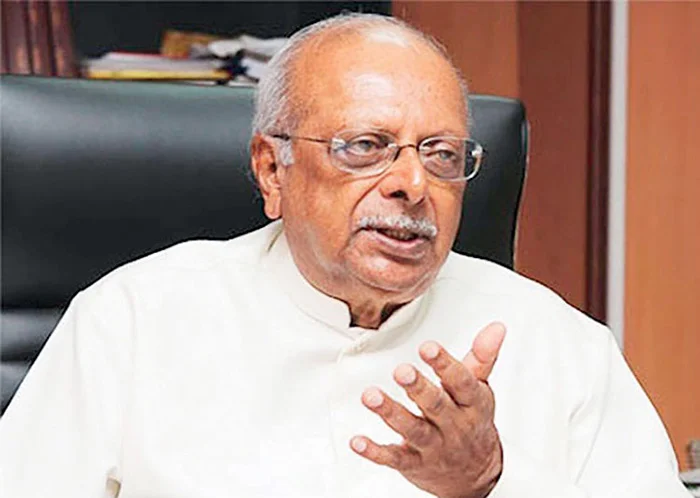
Multi-gifted Prof. Tissa Vitarana in passing,
Leaves a glowing gem of a memory comforting,
Of him putting his best foot forward in public,
Alongside fellow peace-makers in the nineties,
In the name of a just peace in bloodied Sri Lanka,
Caring not for personal gain, barbs or brickbats,
And for such humanity he’ll be remembered….
Verily a standard bearer of value-based politics.
By Lynn Ockersz
-

 Features3 days ago
Features3 days agoWhy does the state threaten Its people with yet another anti-terror law?
-

 Features3 days ago
Features3 days agoVictor Melder turns 90: Railwayman and bibliophile extraordinary
-

 Features3 days ago
Features3 days agoReconciliation, Mood of the Nation and the NPP Government
-

 Features2 days ago
Features2 days agoLOVEABLE BUT LETHAL: When four-legged stars remind us of a silent killer
-

 Features3 days ago
Features3 days agoVictor, the Friend of the Foreign Press
-

 Latest News4 days ago
Latest News4 days agoNew Zealand meet familiar opponents Pakistan at spin-friendly Premadasa
-

 Latest News4 days ago
Latest News4 days agoTariffs ruling is major blow to Trump’s second-term agenda
-

 Latest News4 days ago
Latest News4 days agoECB push back at Pakistan ‘shadow-ban’ reports ahead of Hundred auction


